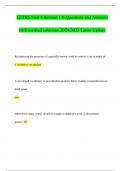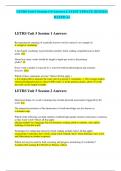LETRS Unit 5 Session 1 6 Study guides, Class notes & Summaries
Looking for the best study guides, study notes and summaries about LETRS Unit 5 Session 1 6? On this page you'll find 21 study documents about LETRS Unit 5 Session 1 6.
All 21 results
Sort by

-
LETRS BUNDLED EXAMS QUESTIONS AND ANSWERS 100% VERIFIED
- Package deal • 14 items • 2024
-
- $19.49
- + learn more
LETRS Unit 6 Session 1-6 Questions and Answers with verified solutions 2024/2025 Latest Update 2 Exam (elaborations) LETRS Unit 6 Guide completed study guide with the latest solutions | latest updated 2024 3 Exam (elaborations) LETRS Unit 6 Assessment with the latest solutions | latest updated 2024 4 Exam (elaborations) LETRS Unit 5 Session 1-6

-
LETRS BUNDLED EXAMS QUESTIOND AND ANSWERS 100% SOLVED
- Package deal • 14 items • 2024
-
- $32.49
- + learn more
LETRS Unit 6 Session 1-6 Questions and Answers with verified solutions 2024/2025 Latest Update 2 Exam (elaborations) LETRS Unit 6 Guide completed study guide with the latest solutions | latest updated 2024 3 Exam (elaborations) LETRS Unit 6 Assessment with the latest solutions | latest updated 2024 4 Exam (elaborations) LETRS Unit 5 Session 1-6

-
LETRS Unit 5 Session 1-6 Questions and Answers with verified solutions 2024/2025 Latest Update
- Exam (elaborations) • 12 pages • 2024
- Available in package deal
-
- $10.49
- + learn more
LETRS Unit 5 Session 1-6 Questions and Answers with verified solutions 2024/2025 Latest Update Recognizing the meaning of a partially known word in context is an example of: d. receptive vocabulary A developed vocabulary in preschoolers predicts better reading comprehension in third grade. true

-
LETRS Unit 5 - Session 1- 6
- Exam (elaborations) • 10 pages • 2024
-
- $8.99
- + learn more
primary activity - >>>> the part of the economy that draws raw materials form the natural environment. secondary activity - >>>> transforms raw materials into manufactured goods; GROWS QUICKLY AS SOCIETIES INDUSTRIALIZE. tertiary activity - >>>> the part of the economy that involves services rather than goods. pre-industrial societies - >>>> hunting and gathering, horticultural, agrarian quaternary activities - >>>> includes jobs ...

-
LETRS Unit 5 Session 1-6 Answers
- Exam (elaborations) • 3 pages • 2023
-
- $8.19
- + learn more
Recognizing the meaning of a partially known word in context is an example of: d. receptive vocabulary A developed vocabulary in preschoolers predicts better reading comprehension in third grade. true About how many words should be taught in depth per week in the primary grades? 10 Every word a student is exposed to is stored in both the phonological and semantic lexicons. false Which of these statements are true? (Select all that apply.) a. It is impossible to measure the exact size of...

-
LETRS Unit 5 Session 1-6 Questions and Correct Answers
- Exam (elaborations) • 7 pages • 2023
- Available in package deal
-
- $9.00
- + learn more
LETRS Unit 5 Session 1-6 Questions and Correct Answers Recognizing the meaning of a partially known word in context is an example of: The way teachers use language has a direct effect on students' vocabulary growth.

-
LETRS Unit 5 Session 1-6 Answers LATEST UPDATE 2023|2024 RATED A+
- Exam (elaborations) • 4 pages • 2023
-
- $11.49
- + learn more
LETRS Unit 5 Session 1-6 Answers LATEST UPDATE 2023|2024 RATED A+ LETRS Unit 5 Session 1 Answers Recognizing the meaning of a partially known word in context is an example of: d. receptive vocabulary A developed vocabulary in preschoolers predicts better reading comprehension in third grade. true About how many words should be taught in depth per week in the primary grades? 10 Every word a student is exposed to is stored in both the phonological and semantic lexicons. false Which of t...

-
LETRS Unit 5 Session 1-6 Answers ALREADY PASSED 2024 UPDATE
- Exam (elaborations) • 3 pages • 2023
-
- $11.49
- + learn more
LETRS Unit 5 Session 1-6 Answers LETRS Unit 5 Session 1 Answers Recognizing the meaning of a partially known word in context is an example of: d. receptive vocabulary A developed vocabulary in preschoolers predicts better reading comprehension in third grade. true About how many words should be taught in depth per week in the primary grades? 10 Every word a student is exposed to is stored in both the phonological and semantic lexicons. false Which of these statements are true? (Select ...
Bundle for LETRS Questions and Answers with verified solutions | Latest updated 2023 Graded A+




